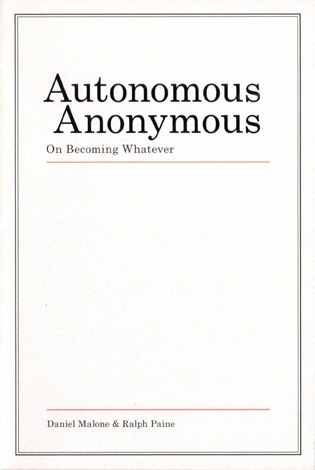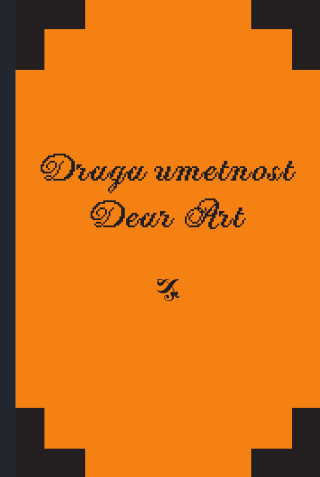Daniel Malone, Ralph Paine: Autonomous Anonymous: On Becoming Whatever (2008)
Filed under pamphlet | Tags: · anonymity, anonymous, autonomy

Publisher Gambia Castle Press
ISBN 9780473139735
28 pages
PDF (no OCR)
Comment (0)James C. Scott: Two Cheers for Anarchism: Six Easy Pieces on Autonomy, Dignity, and Meaningful Work and Play (2012)
Filed under book | Tags: · anarchism, autonomy, bourgeoisie, labour, play, politics, work

“James Scott taught us what’s wrong with seeing like a state. Now, in his most accessible and personal book to date, the acclaimed social scientist makes the case for seeing like an anarchist. Inspired by the core anarchist faith in the possibilities of voluntary cooperation without hierarchy, Two Cheers for Anarchism is an engaging, high-spirited, and often very funny defense of an anarchist way of seeing–one that provides a unique and powerful perspective on everything from everyday social and political interactions to mass protests and revolutions. Through a wide-ranging series of memorable anecdotes and examples, the book describes an anarchist sensibility that celebrates the local knowledge, common sense, and creativity of ordinary people. The result is a kind of handbook on constructive anarchism that challenges us to radically reconsider the value of hierarchy in public and private life, from schools and workplaces to retirement homes and government itself.
Beginning with what Scott calls “the law of anarchist calisthenics,” an argument for law-breaking inspired by an East German pedestrian crossing, each chapter opens with a story that captures an essential anarchist truth. In the course of telling these stories, Scott touches on a wide variety of subjects: public disorder and riots, desertion, poaching, vernacular knowledge, assembly-line production, globalization, the petty bourgeoisie, school testing, playgrounds, and the practice of historical explanation.
Far from a dogmatic manifesto, Two Cheers for Anarchism celebrates the anarchist confidence in the inventiveness and judgment of people who are free to exercise their creative and moral capacities.”
Publisher Princeton University Press, 2012
ISBN 1400844622, 9781400844623
192 pages
review (Malcolm Harris, Los Angeles Review of Books)
review (Michael Weiss, The Wall Street Journal)
review (Malcolm Harris, Salon)
review (Jennifer Schuessler, The New York Times)
PDF (updated on 2016-12-23)
Comment (0)What, How and for Whom (eds.): Dear Art (2012)
Filed under booklet, catalogue | Tags: · art, art system, autonomy, contemporary art, institutional critique

“Dear art,” Mladen Stilinović wrote in 1999, “I am writing you a love letter to cheer you up and encourage you to come and visit me some time”. Always acutely aware of his own complicity and involvement, in his address to art Stilinović intimates a set of troubled, poetic, enigmatic and modest observations on the standing of art in the contemporary world, its reception and distribution. But he also questions the value of art, which far too often is translated exclusively in monetary terms, or as he puts it: “quick manipulation, quick money, quick oblivion”.
As in several previous shows curated by What, How and for Whom/WHW, Dear Art takes its title from a work by Mladen Stilinović, and once again its wager is set on the “classical” exhibition format. Amidst the disillusionment created by the persistent feeling of failure (coming from the fact that attempts for a radical reconfiguration of art and cultural production in general always become almost immediately spectacularized), Dear Art insists on the obstinate repetition of what has become the curatorial method. Obsessed with the interconnectedness of art and politics and plagued by the nature of art’s “inefficiency,” it attempts to ask necessary questions: Why do we still need art, and what is it that we expect to get from art today? What is its promise, and what do we promise it in return? And what happens when this promise is broken, betrayed, and just plain exhausted?
“Dear Art” approaches questions of the artist’s autonomy and art’s necessity through works that deliberately blur the relationship between engagement, self-referentiality and aesthetics. Engaged with a range of contradictory, heterogeneous methods that affirm endurance, endure indecisiveness, face misunderstandings and reassert allegiances, the works included address the ways in which misunderstanding, confusion, regret, possession, appreciation and devaluation, support and solidarity play out in contemporary art practice, and in defining one’s practice in relation to discussions on reconfiguring the field of art and its relationship to the political.
The exhibition is accompanied by a publication, with texts by Mladen Stilinović, WHW and Stephen Wright, featuring works by Mounira Al Solh & Bassam Ramlawi, Halil Altindere, Rossella Biscotti, Chto delat?, Every Man is a Curator / Jeder Mensch ist ein Kurator. An archive as a tool, Fokus grupa (Iva Kovač & Elvis Krstulović), Siniša Ilić, Sanja Iveković, Janez Janša, Janez Janša, Janez Janša, Lutz Krüger, Marina Naprushkina, Hila Peleg in collaboration with Tirdad Zolghadr & Anton Vidokle, Cesare Pietroiusti, Public Library (Luka Prinčič, Marcell Mars, Tomislav Medak, Vuk Ćosić), Greg Sholette, Mladen Stilinović, and Wendelien Van Oldenborgh.
Publisher Moderna galerija, Ljubljana, November 2012
56 pages
exhibition (29 November 2012 – 10 February 2013, Museum of Contemporary Art Metelkova, Maistrova 3)
Comment (0)
